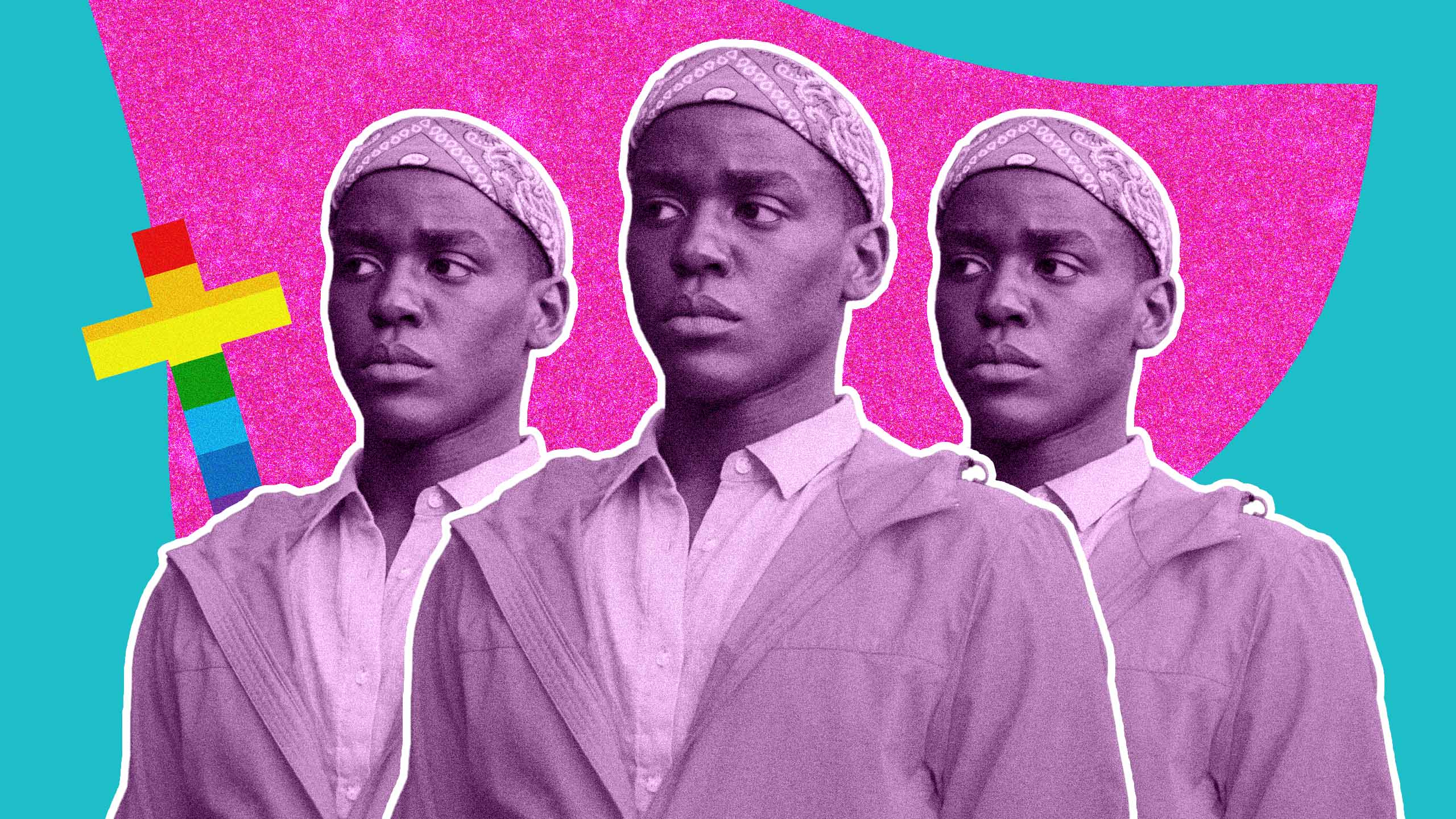Over four seasons, Sex Education has shone light on complicated topics, from queerness and coming out to substance use, to bullying to overcoming trauma. The show rarely digs deep into most of these issues, preferring instead to keep the majority of storylines feel-good—bad things do happen in the Sex Education universe, but hardship is almost always overcome.
In the show’s final season, which was released last week on Netflix, audiences got new insight into the life of Eric Effiong (Ncuti Gatwa). The teenager is facing turmoil—trying to reconcile his Christianity with his queerness and to find a space in the house of God without hiding parts of himself the church would prefer he kept silent. Eric is attending classes at his church as he prepares to get baptized—but he routinely agonizes over whether this is the right choice, given that he’s forced to hide his queerness from his fellow congregants. It’s in this turmoil where Eric begins to have prophetic dreams and visions and wonders if God is trying to give him a sign.
This problem Eric faces isn’t at all new, and what he’s going through is something many queer Christians understand: the longing for a space in the church and wanting to exist freely without being told you’re living in sin; the anxiety that the topic of your pastor’s next sermon will be the LGBTQ+ community; the fear that your community will cast you out if they find out who you love.
As a gay man who grew up in a Christian Nigerian household like Eric, I understand what it means to try and reconcile your sexuality with Christianity, and why many would rather do this reconciliation than walk away from their churches. The Nigerian Christian church is often more than a place of worship. It is a community of people who want you to grow in the way of the Lord, and often look out for you through mentorships, career and educational opportunities and providing a space where you can talk about most of the things bothering you.
“In Nigerian church programs on the radio people got healed of homosexuality. I spent my days in church hoping I had a secret healing instead of a public one.”
I come from a very Christian household. My uncle was the bishop of our church, my dad was a deacon and an usher and my mom was in the choir. This meant I needed to be a model child in church, join departments and preach. I understood that I was queer fairly early on, when I developed a crush on a childhood friend—and I desperately wanted that to change. I remember listening to Nigerian church programs on the radio where people got “healed” of homosexuality. I spent my days in church hoping I had a secret healing instead of a public one.
I was in Sunday school the first time I learned about homosexuality being a sin. We were reading the Bible story about Sodom and Gomorrah, and were told that God destroyed them because of their sins. These sins, the Sunday school teacher would later go on to mention, would include homosexuality. She spoke about it with disgust in her voice, while reminding us that it was an abomination to lie with a man as with a woman.
Many Christian churches create unsafe spaces for queer kids, reminding us that the only way to save ourselves is to come to Jesus and to not indulge in the sin that is homosexuality. If we live as our true selves, we’re told, we’ll go to hell. The fear of hell, the fear of condemnation, of people looking at me with disgust were enough to make me not want to be gay.
In the season finale, when it’s time to get baptized, Eric stands before his congregation and is asked to renounce the devil and all his works. He pauses for a moment before asking to speak. Then, explaining that he no longer wants to hide, he comes out to the church as gay. Afterward, he sees the disapproving looks of the pastor and church members, and ultimately decides to leave the ceremony.
But even this plotline ends on a typical feel-good note: After another character reminds Eric that “your relationship with God is personal” (something we hear all the time in Christian spaces), he decides that he wants to become a pastor himself and teach Christianity on his own terms. By the end of the episode, his church members have come around, and accept him with open arms. Here, Sex Education subtly says, “Christianity is not great,” while also saying, “but you can make it work!”
Watching this storyline wrap up so quickly felt flat and rushed because, for all the visions Eric had, and the bullying he endured throughout the show, “God” helped him to see the light.
Some LGBTQ+ people do find ways to hold on to their faith, but the show’s resolution glosses over the complications so many of us have to contend with.
I understand the need of wanting to hold on to one’s belief, but often doing so requires LGBTQ+ people to reinterpret teachings and Bible passages that continue to be used to denigrate queer and trans people—it requires us to work within a system that continues to be a tool of oppression. This is a journey that can’t be taken in a matter of weeks.
Coming out to myself wasn’t easy after years of believing. Just like Eric, I’m now out to my family, but the experience of hiding and living in shame held me down for a long time. It took a long time to embrace my queer identity.
While this portrayal of reconciling one’s queerness with faith is one of the very few representations of queer Black Christianity on TV, and is a good start, it leaves you wanting more nuanced and complicated looks at the reality of that experience.


 Why you can trust Xtra
Why you can trust Xtra


